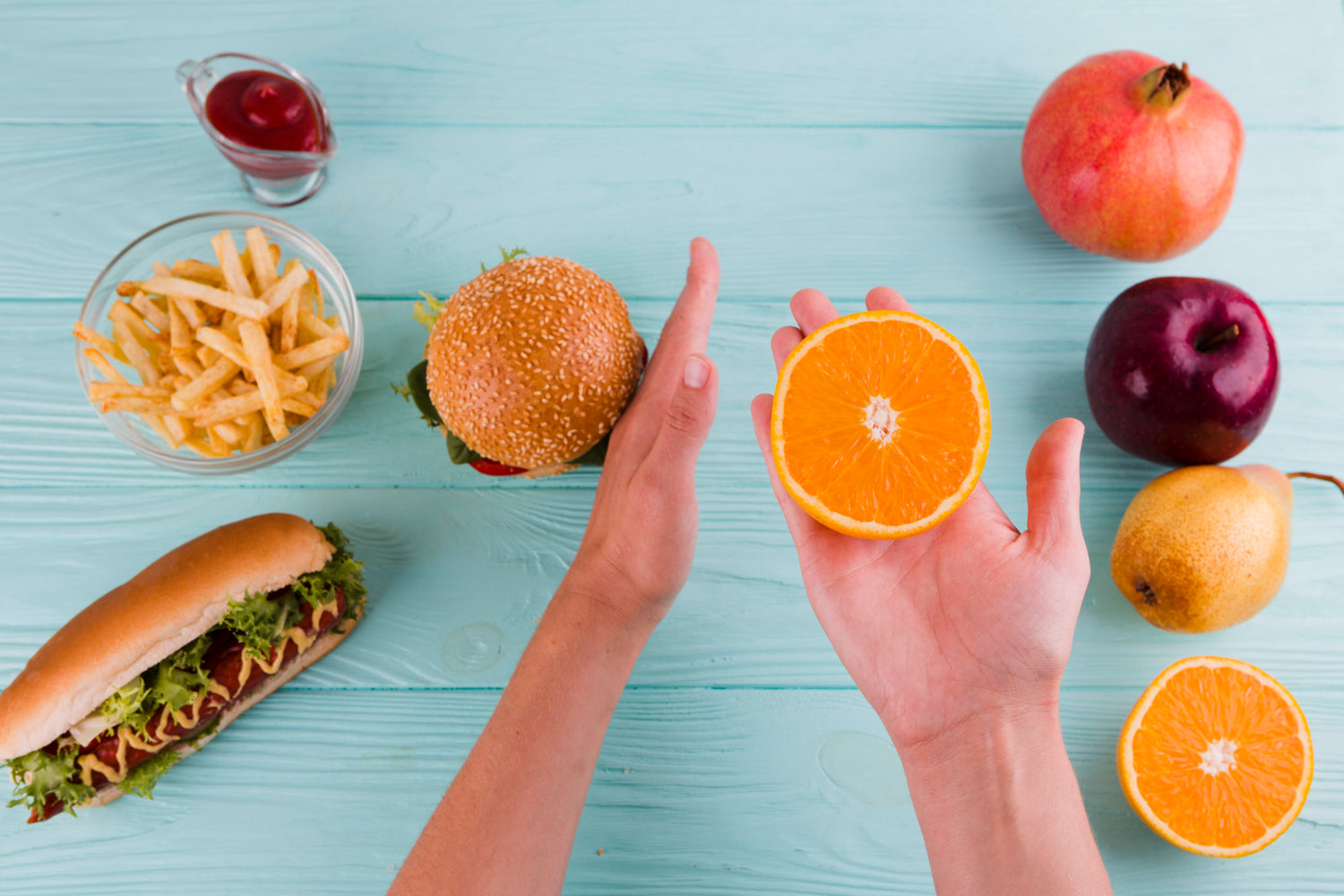Managing blood sugar levels isn't just a task for doctors and those with diabetes; it's something we all should pay attention to. After all, who wouldn't want to feel more energetic, think more clearly, and avoid those dreaded sugar crashes? So, let's discuss how to manage blood sugar levels like an expert.
Picture this: you're at a party, and someone offers you a slice of cake. Do you accept it and brace yourself for the sugar rush? Or do you decline and miss out on the fun? The good news is you don't have to choose between enjoyment and health.
By understanding blood sugar levels and how to manage them, you can have your cake and eat it, too—without the guilt or the glucose spikes.
Ready to become a blood sugar master? Let's dive in!
The Basics About Blood Sugar Levels
First things first, what exactly are blood sugar levels, and why should you care?
Blood sugar, or glucose, is the main sugar in your blood. It comes from your food and is your body's primary energy source. Your body regulates blood sugar levels to keep them within a healthy range (1).
When this balance is disrupted, it can lead to conditions like hyperglycemia (high blood sugar) or hypoglycemia (low blood sugar) (2).
Now, you might be thinking, "I'm not diabetic, so why should I worry about this?"
Great question! Even if you don't have diabetes, maintaining stable blood sugar levels is crucial for your overall health. It affects your mood, energy levels, and even your ability to focus. Have you ever felt irritable or tired after a big meal? That's your blood sugar playing tricks on you.
So, how do you manage blood sugar levels effectively? The secret lies in making smart lifestyle choices and knowing a few tricks to keep your glucose in check. Trust me, it’s easier than trying to figure out why your phone battery never lasts as long as it should!
Lifestyle Changes to Manage Blood Sugar Levels
Managing blood sugar levels starts with making some simple yet powerful lifestyle changes. And no, it doesn’t involve saying goodbye to all your favorite foods. Let’s explore how tweaking your diet and exercise routine can make a big difference.
Diet Tips
Foods with a low glycemic index (GI) cause a slower rise in blood sugar levels. Think whole grains, legumes, and most fruits and vegetables. Swap out that white bread for whole grain, and your blood sugar will thank you (3).
High-fiber foods slow down the absorption of sugar and help control blood sugar levels. Foods like beans, lentils, and oats are fantastic choices (4). Plus, they keep you feeling full longer—goodbye, mid-afternoon snack attack!
Include sources of healthy fats like avocados, nuts, and olive oil. They don’t raise blood sugar and can help you feel satisfied (5). And who doesn’t love an avocado toast?
Exercise Tips
Exercise is like a magic pill for managing blood sugar levels. When you exercise, your muscles use glucose for energy, which helps lower your blood sugar levels. Plus, regular physical activity makes your body more sensitive to insulin, the hormone that regulates blood sugar (6).
Activities like walking, running, or swimming can lower blood sugar levels and improve your overall health. Aim for at least 30 minutes most days of the week. Walking the dog counts, and if you don’t have a dog, borrow the neighbor’s!
Building muscle mass through strength training helps your body use glucose more efficiently. You don’t need to become a bodybuilder; even light weights or resistance bands can make a difference (7).
By combining a balanced diet with regular exercise, you'll be well on your way to mastering how to manage blood sugar levels. And remember, every little change counts. So, let’s move on to the natural supplements that can give you an extra edge in this journey.
Supplements to Help Manage Blood Sugar Levels
In addition to lifestyle changes, certain supplements can be incredibly beneficial in helping manage blood sugar levels. Here are five supplements to turn you into a blood sugar-managing wizard.
Berberine
Berberine is a compound found in several plants and has been used in traditional Chinese medicine for centuries. It's particularly effective in lowering blood sugar levels by increasing insulin sensitivity and decreasing glucose production in the liver.
Research has shown that berberine can be as effective as some pharmaceutical drugs in controlling blood sugar.
Typically, 500 mg taken two to three times a day is recommended. But as with all supplements, it's best to start slow and see how your body responds.
Magnesium Taurate
Magnesium plays a crucial role in glucose metabolism, and many people with blood sugar issues are often deficient in it. Magnesium taurate combines magnesium with taurine, an amino acid, which may offer additional benefits for heart health.
It helps improve insulin sensitivity and can also reduce the risk of cardiovascular diseases.
A typical dose is 200-400 mg per day, preferably taken with meals.
Apigenin
Apigenin is a flavonoid found in many fruits and vegetables, particularly in parsley, celery, and chamomile tea. It has antioxidant and anti-inflammatory properties that can help manage blood sugar levels.
Apigenin helps in improving glucose uptake by cells and reduces oxidative stress, which is often high in people with blood sugar problems.
There isn't a standard dosage, but supplements typically range from 50-500 mg per day.
Quercetin
Quercetin is another flavonoid with powerful antioxidant properties, found in foods like apples, onions, and berries. It can help lower blood sugar levels and improve insulin sensitivity.
Quercetin helps in reducing blood sugar spikes and has anti-inflammatory effects.
A common dosage is 500-1000 mg per day, taken with meals.
Resveratrol
Resveratrol is famous for being found in red wine (yes, you heard that right!), but you can also get it from grapes, berries, and peanuts. It’s known for its heart-protective properties and can also help manage blood sugar levels.
Resveratrol improves insulin sensitivity and can lower blood sugar levels.
Supplements typically range from 100-500 mg per day.
By incorporating these natural supplements into your routine, you can give your blood sugar management efforts a significant boost. Just remember, supplements are not a substitute for a healthy diet and lifestyle—they’re the cherry on top of your blood sugar management sundae!
Additional Tips for Managing Blood Sugar Levels
Managing blood sugar levels goes beyond diet, exercise, and supplements. Here are a few more tips to keep your glucose in check:
Regular Monitoring
Keeping track of your blood sugar levels can help you understand how different foods, activities, and stress levels affect you. It’s like being your own detective, and the clues are in the numbers.
Stress Management
Chronic stress can wreak havoc on your blood sugar levels (8). Practice stress-reducing activities like meditation, deep breathing exercises, or yoga. And remember, binge-watching your favorite comedy show also counts as stress relief. Laughter is, after all, the best medicine!
Adequate Sleep
Poor sleep can affect your insulin sensitivity and blood sugar levels. Aim for 7-9 hours of quality sleep per night (9). Think of it as recharging your internal battery, which helps keep your glucose levels stable.
Stay Hydrated
Drinking plenty of water helps your kidneys flush out excess sugar through urine. Plus, staying hydrated can help you feel full and reduce the temptation to snack on sugary treats.
By following these additional tips, you’ll be well-equipped to manage your blood sugar levels effectively. It’s all about finding the right balance and making choices that support your overall health.
The Bottom Line
Managing blood sugar levels doesn’t have to be a daunting task. By making smart lifestyle changes, incorporating natural supplements, and following some simple tips, you can master how to manage blood sugar levels like an expert. Remember, it’s all about balance and consistency. So, go ahead and enjoy that slice of cake at the party—just make sure you’ve got your blood sugar management strategies in place. Cheers to a healthier, more energetic you!
References
- Drury DR. Control of Blood Sugar. The Journal of Clinical Endocrinology & Metabolism [Internet]. 1942 Jul [cited 2023 Mar 12];2(7):421–30. Available from: https://academic.oup.com/jcem/article/2/7/421/2722546
- Leszek Szablewski. Glucose homeostasis and insulin resistance [Internet]. Saif Zone, Sharjah, United Arab Emirates: Bentham Science; 2011. Available from: https://benthambooks.com/book/9781608051892/
- Harvard Health Publishing. A good guide to good carbs: The glycemic index - Harvard Health [Internet]. Harvard Health. Harvard Health; 2019. Available from: https://www.health.harvard.edu/healthbeat/a-good-guide-to-good-carbs-the-glycemic-index
- Gray A, Threlkeld RJ. Nutritional recommendations for individuals with diabetes [Internet]. Nih.gov. MDText.com, Inc.; 2024. Available from: https://www.ncbi.nlm.nih.gov/books/NBK279012/
- DiNicolantonio JJ, O’Keefe JH. Monounsaturated Fat vs Saturated Fat: Effects on Cardio-Metabolic Health and Obesity. Missouri medicine [Internet]. 2022;119(1):69–73. Available from: https://www.ncbi.nlm.nih.gov/pmc/articles/PMC9312452/
- Abushamat LA, McClatchey PM, Scalzo RL, Reusch JEB. The role of exercise in diabetes [Internet]. PubMed. South Dartmouth (MA): MDText.com, Inc.; 2023. Available from: https://www.ncbi.nlm.nih.gov/books/NBK549946/
- Holten MK, Zacho M, Gaster M, Juel C, Wojtaszewski JFP, Dela F. Strength Training Increases Insulin-Mediated Glucose Uptake, GLUT4 Content, and Insulin Signaling in Skeletal Muscle in Patients With Type 2 Diabetes. Diabetes [Internet]. 2004 Jan 27;53(2):294–305. Available from: https://doi.org/10.2337/diabetes.53.2.294
- Sharma K, Akre S, Chakole S, Wanjari MB. Stress-Induced diabetes: A review. Cureus [Internet]. 2022;14(9). Available from: https://www.ncbi.nlm.nih.gov/pmc/articles/PMC9561544/
- Singh T, Ahmed TH, Mohamed N, Elhaj MS, Mohammed Z, Paulsingh CN, et al. Does Insufficient Sleep Increase the Risk of Developing Insulin Resistance: A Systematic Review. Cureus [Internet]. 2022 Mar 26; Available from: https://doi.org/10.7759%2Fcureus.23501









